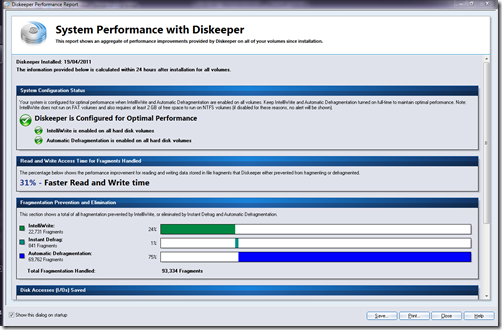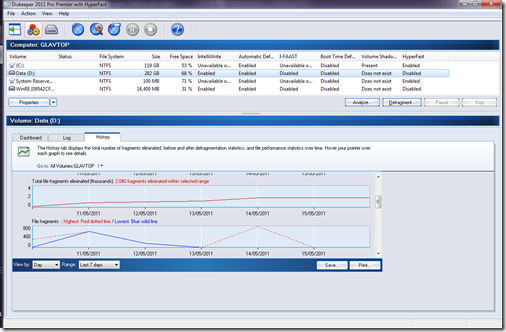Diskeeper–a short review
I have been lucky enough to be ASP.NET MVP for a number of years now. One of the perks of that is you get access to free licences of software such as Diskeeper. This piece of software keeps your disks running as smooth as they possibly can.
I have been using Diskeeper for around 2 months now and am pretty impressed. It silently does its thing in the background without you having to touch anything. One of the newest and also one of my favourite features is the automatic defrag capability.You don’t have to launch a defrag application and have it run on your system or schedule it to run periodically, as Diskeeper performs this operation all the time, in the background for all disk operations. Basically, you just use your system like normal, and it just magically gets defragmented, all the time. Nice.
I have 2 disks in my system. A SSD (Solid State Drive) as my primary ( C: ) drive, and a 5200rpm 320Gb hard disk as my secondary data drive ( D: ). After installing Diskeeper, I have noticed a significant difference in the performance of the secondary drive in particular. I imagine because it is the slowest disk and because it stands to benefit the most. The SSD is fast anyway, so it is much harder to notice any difference. I have noticed a small difference, but it’s only slight compared to the secondary ( spinning rust ) drive.
I should mention that in order for Diskeeper to work with SSD hardware, you need a special edition of Diskeeper with an add-on called Hyper-fast that takes into account the SSD unit and has special algorithms that are designed to optimise SSD operation.
For those interested in the actual metrics, Diskeeper provides an easy to use management console that displays your current system improvements. The initial display is shown below.
The management console offers a number of ways to look at what has been done to your disks and how it has been performing. I find the history view particularly interesting as it proves a look at how the disk is being used and optimised over time.
So would I recommend it? Yes, and this is not simply because I have been given a free licence and feel obligated to do so. It is particularly useful if you have standard hard disks regardless of how fast they spin. You will notice a much smoother and responsive system as a result. For SSD owners, it is still worthwhile but the benefits are less because of the inherent speed in SSD units. For a system with a mix of SSD and hard disks, it works beautifully.

